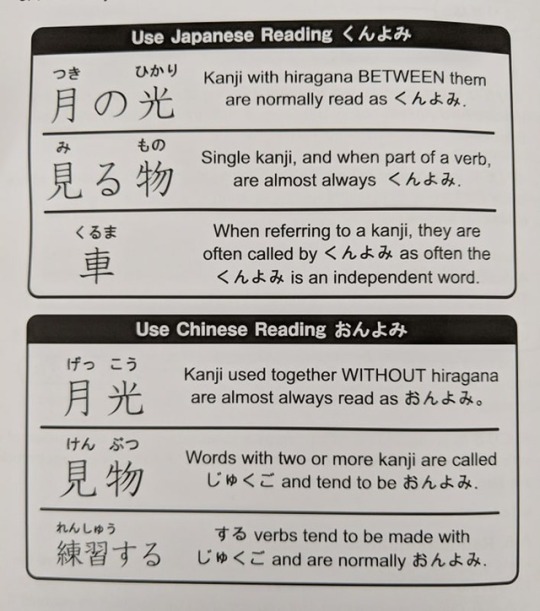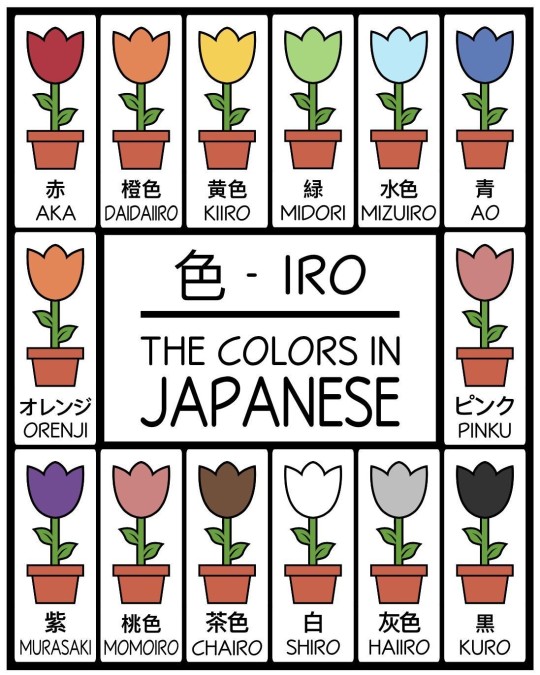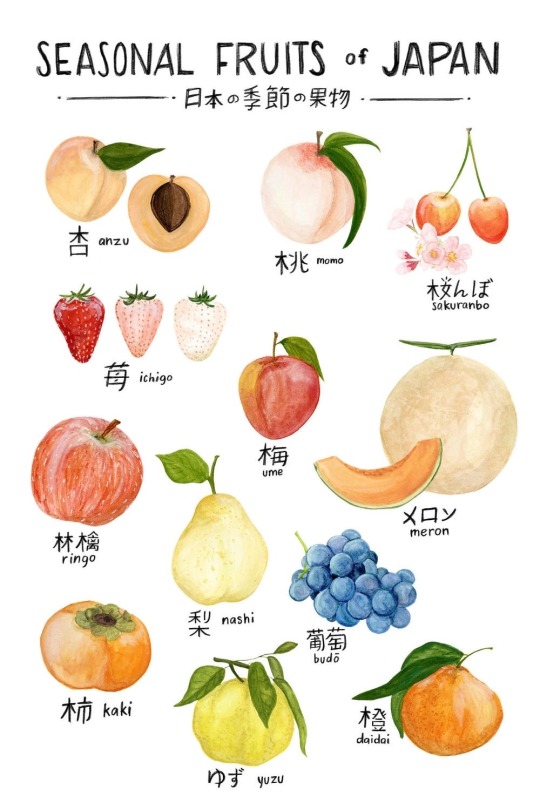Photo

Common Japanese Verbs
Hey guys, below is a list of what I believe to be common Japanese verbs! I’ll also be posting a list of common adjectives, adverbs, and nouns in the future too, so keep an eye out for them!
There are a number of ways that verbs have been categorised in Japanese, such as Ichidan 「一段」 and Godan 「五段」, and う verbs and る verbs. I’ve listed them all in the titles for easier understanding, depending on what distinction you’re familiar with. These classifications come in handy when you need to conjugate verbs so try to remember what category they belong to!
うverbs・五段「ごだん」・Class 1:
To begin (something starts on its own)・始まる・はじまる
To buy・買う・かう
To close・閉まる・しまる
To die・死ぬ・しぬ
To drink・飲む・のむ
To eat・食べる・たべる
To end・終わる・おわる
To enter・入る・はいる
To give back (return something to someone)・返す・かえす
To go・行く・いく
To go back・戻る・もどる
To have/exist (inanimate objects)・ある
To know・知る・しる
To learn・習う・ならう
To listen・聞く・きく
To make・作る・つくる
To meet・会う・あう
To play・遊ぶ・あそぶ
To receive・貰う・もらう
To repair・直す・なおす
To return・帰る・かえる
To ride on・乗る・のる
To run・走る・はしる
To send・送る・おくる
To sit・座る・すわる
To speak・話す・はなす
To swim・泳ぐ・およぐ
To take・取る・とる
To take off (shoes, clothes)・脱ぐ・ぬぐ
To understand・分かる・わかる
To use・使う・つかう
To wait・待つ・まつ
To wake up・起こす・おこす
To wash・洗う・あらう
To write・書く・かく
るverbs・一段「いちだん」・Class 2:
To answer・答える・こたえる
To bathe・浴びる・あびる
To be able・出来る・できる
To be born・生まれる・うまれる
To be enough・足りる・たりる
To begin (to start something)・始める・はじめる
To borrow・借りる・かりる
To break・壊れる・こわれる
To check・調べる・しらべる
To cut・切れる・きれる
To exceed・過ぎる・すぎる
To find・見つける・みつける
To forget・忘れる・わすれる
To get off・降りる・おりる
To get tired・疲れる・つかれる
To give・あげる
To go out・出る・でる
To greet・迎える・むかえる
To have/exist (animate objects)・いる
To help・助ける・たすける
To make a mistake・間違える・まちがえる
To open・開ける・あける
To remember・覚える・おぼえる
To see・見える・みえる
To show・見せる・みせる
To sleep・寝る・ねる
To stop・止める・やめる
To teach・教える・おしえる
To think・考える・かんがえる
To wear・着る・きる
Irregular verbs・Class 3:
To come・来る・くる
To do・する
する verbs:
する verbs are made by adding する to a noun.
To ask questions・質問する・しつもんする
To be surprised・びっくりする
To call・電話する・でんわする
To do the cleaning・掃除する・そうじする
To do the washing・ 洗濯する・せんたくする
To get married・結婚する・けっこんする
To go shopping・買い物する・かいものする
To have a meal・食事する・しょくじする
To reserve・予約する・よやくする
To study・勉強する・べんきょうする
To take a walk・散歩する・さんぽする
To travel・旅行する・りょこうする
7K notes
·
View notes
Photo

Expressing Your Emotions || 感情・かんじょう・Emotions
Hey guys, today I’m going to list a couple different ways to express your emotions or feelings in conversation in Japanese!
Adjectives・形容詞「けいようし」:
Amazing・凄い・すごい
Afraid・こわい
Bad・悪い・わるい
Difficult (emotionally)・辛い・つらい
Embarrassed・恥ずかしい・はずかしい
Fun・楽しい・たのしい
Happy・嬉しい・うれしい
Jealous・羨ましい・うらやましい
Sad・悲しい・かなしい
One adjective which might appear often in conversation is the word 「ヤバい・ヤバイ・やばい」which can be used to express a few different emotions depending on the context. I’ve heard it used to express both positive and negative emotions/feelings/thoughts like: dangerous, terrible, crap, awful, amazing, wow, cool.
Nouns・名詞「めいし」:
Anger・怒り・いかり
Delight/Joy・喜び・よろこび
Emotions・感情・かんじょう
Feelings・気持ち・きもち
Feeling/Mood・気分・きぶん
Happiness・幸せ・しあわせ
Sadness・悲しみ・かなしみ
Examples・例「れい」:
Below I’m going to list a few examples of how to express your feelings in Japanese. It’s important to know that you don’t have to use 私は/僕は/俺は/etc. before stating your feeling because it’s obvious in the context that you’re expressing your own emotions!
Angry・Annoyed -
ひどい!・You’re awful/mean OR That’s awful!
ひどーーい!・You’re aaaawful! OR That’s aaaawful!
ムカつく!・むかつく!・I’m pissed off.
イライラする!・I’m irritated!
ウザイ・Annoying!
ちぇっ・チェ・tsk/Dang/Shoot
Confused -
どうしよう?・What am I gonna do?
Difficult -
辛い・つらい・It’s hard.
きつい・It’s hard.
Embarrassed -
あー、恥ずかしい!・あー、はずかしい!・I’m so embarrassed!
Happy -
嬉しい!・うれしい!・I’m happy!
嬉しいなあ!・うれしいなあ!・I’m so happy!
あー幸せ!・あーしあわせ!・I’m so happy!
やった〜!・Yay!
イェーイ!・Yaaay!
楽しい!・ How fun!
楽しすぎる !・Way too fun!
ワクワクする !・I’m getting excited!
わあ!・Wow!
すごい!・Wow/Great!
すごーい!・Woow!
すげえ!・Wow!
Jealous -
羨ましい!・うらやましい!・I’m jealous!
羨ましい―――!・うらやましいーーー!・I’m soooo jealous!
Nervous -
ドキドキする!・I feel nervous!
緊張する!・きんちょうする!・I’m nervous!
不安になる・ふあんになる・I’m anxious
Nostalgic -
懐かしい!・なつかしい!・This brings back memories.
Relieved -
安心した!・あんしんした!・I feel relieved.
よかった!・Whew!
あー、よかった!・I’m relieved!
Sad・Lonely -
悲しい!・かなしい!・I’m sad
泣きたくなる!・なきたくなる!・I feel like crying!
寂しい・さみしい/さびしい・I’m lonely
あーあ…・Oh well…
くすん・ぐすん・Sniffle
Scared -
びくびく・Symbolises being afraid or timid.
こわい!・I’m scared!
Shocked・Surprised -
うそ!・No way!
マジ?・まじ?・Really/No way/Seriously?
マジかー?・まじかー?・Really/No way/Seriously? (a little masculine)
マジで?・まじで?・Really?
えーー!うそ、マジで!?・What? No way!
え!・What?/Really?
えー!・What?/Really?
えーーっ!!・What?/Really?
うわー!・OMG
いや・イヤ・Why?/Oh
いややあー・Whyyy?
ありえない!・No way!/I can’t believe it!
信じられない!・しんじられない!・I can’t believe it!
皆さん、今どんな気持ち?
Everyone, how are you feeling right now?
#studyblr#langblr#japanese#japanese language#japanese langblr#japanese studyblr#studyspo#study notes#studygram#learn japanese#study japanese#practice japanese#language#languages#japanese study#japanese practice#日本語#にほんご#mine#text#feelings#emotions#popular post#vocabulary
7K notes
·
View notes
Text
Using 感じ to express your feelings in Japanese
A lot of people seem to think that expressing your feelings in Japanese is difficult, and while it can be, there are a lot of different variations used in Japanese to express feelings. I promise it isn’t that bad!
First, let’s start with some vocabulary:
喜怒哀楽
きどあいらく = human emotions (joy, anger, humor, etc)
Common Nouns: In Japanese, い-adjectives can often become nouns (高い = tall, 高さ = height). Be careful not to use adjectives on accident when you should use nouns!
気持ち(きもち)feeling(s)
気分(きぶん)feeling(s)/mood
感情(かんじょう)emotions
喜び(よろこび)delight
幸せ(しあわせ)happiness
怒り(いかり)anger
悲しみ(かなしみ)sadness
Common Verbs: Similarly, a lot of adjectives/nouns and verbs share the same stems, but will have different endings. Be careful!
喜ぶ(よろこぶ)to be delighted
悲しむ(かなしむ)to be sad
怒る(おこる)to be/get angry
激怒する(げきどする)to be furious
憤慨する(ふんがいする)to be furious
You’ll commonly see these verbs appear in て-form in order to describe a present state, such as 怒っている (to be in a state of anger) or 喜んでいる (to be in a state of delight).
Common Adjectives:
嬉しい(うれしい)happy
悲しい(かなしい)sad
楽しい(たのしい)fun
辛い(つらい)hard/tough/painful
きつい hard/tough
凄い(すごい)wow, great
やばい expresses various things
When describing your own happiness, it’s more natural to use 嬉しい and not 喜んでいる. However, when describing someone else’s happiness, you should use 喜んでいる and not 嬉しい.
辛い(辛い)and 辛い(からい)look the exact same, but one means “tough” and the other means “spicy.” Pay attention to context!
Expressing your emotions
When describing your own emotions, it’s actually quite uncommon to use any first person pronouns (such as 私) unless the subject is not at all clear. Likely, though, the subject is you and the listener knows this.
Joy & Happiness
あ〜、嬉しいな!ー I’m happy!
な is often used in Japanese when expressing your feelings
あ, ああ, and あー are also often used
やった〜!ー Yay!
イェーイ!ー Yaaay!
楽しい!ー Fun!
楽しすぎる ー Using すぎる can express the nuance of “too much fun”
ワクワクする ー I’m getting excited!
It’s common in Japanese to use onomatopoeia to express emotion!
すごい!ー Wow! Great!
This is commonly used in variations (すご〜い!すげえ!and so on)
Relief & Surprise
あ〜、よかった!ー I’m relieved!
安心した(あんしん)ー I feel relieved.
え〜!ー What?
うそ!ー No way!
まさか ー No way! It can’t be true.
まじ ー Really? No way! Seriously?
まじか ー Really? No way! Seriously?
This one is sometimes seen as more masculine
信じられない ー I can’t believe it
Nervousness & Sadness
緊張する(きんちょう)ー I’m nervous…
Really common, and can also be used in its て-form!
ドキドキする ー I feel nervous.
悲しい(かなしい)ー I’m sad.
寂しい(さみしい・さびしい)ー I’m lonely / I miss someone
憂鬱(ゆううつ)ー Depression
気が滅入る(きがめいる)ー I feel depressed
がっかり ー I’m disappointed
落ち込む(おちこむ)ー I’m getting upset!
Anger
ひどい!ー That’s terrible! You’re awful!
イライラする ー I feel irritated
頭にきた ー I’m so pissed off
ムカつく ー I’m angry
Embarrassment: 恥ずかしい(はずかしい)ー I’m embarrassed.
Fear: 怖い(こわい)ー I’m scared.
Envy: 羨ましい(うらやましい)ー I’m jealous.
Using 感じ and 感じる
If you talk to a Japanese person for any length of time, you’ll hear this come up quite often. The readings are “かんじ” and “かんじる”. Remember that the meaning of 感 is “feeling,” so if you see it in kanji compounds you’re likely dealing with someone to do with feeling (emotion or otherwise).
感じ is the noun form and 感じる is the verb form:
どんな感じがしましたか?How did you feel?
どんな感じましたか?How did you feel?
These feelings can be both physical and emotional.
変な感じがした…
へんなかんじがした…
I felt strange…
彼女はなんか冷たい感じがするね。
かのじょはなんかつめたいかんじがするね。
She seems to be kind of cold, huh?
地震があったみたいだけど何も感じなかった。
じしんがあったみたいだけどなにもかんじなかった。
It seems there was an earthquake but I didn’t feel anything.
There are a lot of colloquial uses as well, particularly: って感じ, which is a really common way for Japanese to express the feeling of “it’s like…”
学校はね…もういいかなって感じ。
I think I’ve had enough with school.
私ばかり働いているって感じ。
I feel like I’m the only one that works.
You can use って感じ in a lot of ways, and it’s especially common when speaking.
気がする
Use this when expressing that you sense something/feel something but can’t quite understand why you feel that way.
If you’re breaking up with your significant other, you might say something like 私たち、もう終わりのような気がする which roughly translates to “I feel like we’re over now.”
面白いことが起きるみたいな気がする…
おもしろいことがおきるみたいなきがする…
I feel like something interesting will happen…
旅行したい気がする。
りょこうしたいきがする。
I feel like going on a trip.
食べる気がしない。
たべるきがしない。
I don’t feel like eating.
Try to express your emotions as much as possible when talking to people, especially if you’re talking about your day or something that you did with that person. It adds a personal touch and will make sure your conversation remains warm for both of you.
頑張ってください!
#mine#japanese#langblr#languages#language learning#learning languages#japanese langblr#grammar#日本語#文法
5K notes
·
View notes
Photo

For all those times you ask yourself, “Onyomi or Kunyomi??”
#Kanji#useful#cheat sheet#reading#japanese language#japanese langbr#nihongo#study tips#college#languages#日本語#日本#Japan#Japanese#Learning Japanese#Japanese Study#Studyblr#Langblr#Japanese Langblr#Student#University#Studying#mine
8K notes
·
View notes
Text
Common Japanese Homophones
Hi guys! Today I will be talking about Japanese homophones and when to use them. These are the ones that I used to have a lot of trouble with, but there are a lot more so I encourage you to research/study more homophones.
1. あつい
暑い “used when talking about the weather (temperature)”
熱い “hot to the touch” or “full of enthusiasm”
厚い “to be thick”
Examples
今年の夏は特に暑いですね。
This summer is especially hot.
このスープは熱すぎて食べれない。
This soup is too hot to eat.
サリーは桜のセブチへの熱い思いに心を動かされた。
Sally was moved by Sakura’s enthusiasm towards SEVENTEEN.
このシャツの記事はすごく厚いね。
This shirt’s fabric is very thick.
2. あう
会う “to meet someone”
合う “to go together/match” or “to come across something”
Examples
京都でお気に入りのYouTuberに出会った。
I bumped into a YouTuber I like in Kyoto.
この色は肌色に合わない。
This colour doesn’t complement my skin tone.
一生に一度の大チャンスに巡り合った。
I came across a once in a lifetime chance.
3. あたたかい
暖かい “warm weather”
温かい “warm to the touch” or “having emotion/empathy”
Examples
この部屋は暖かいですね。
This room is warm.
のどが痛いから温かい飲み物を飲みたいな。
I want something warm to drink because I have a sore throat.
とても心温まる話でした。
It was a very heartwarming story.
4. あし
足 “a foot or feet from ankle outwards”
脚* “legs from the waist down” or “something that serves a similar purpose”
Examples
そのアイドルの足はめっちゃでかいね!
That idol’s feet are really big!
私の脚が長かったらよかったな。
I wish my legs were long.
椅子の脚が壊れてますよ。
The chair leg is broken.
*While there is an official distinction between “足” and “脚”, there are many cases in which “足” is used to write “脚”. This is because the kanji is easier to write!
5. はやい
早い “early”
速い “fast”
Examples
早起きだね。
You wake up early.
佐藤さんって脚速い。
Satou-san is a fast runner.
1K notes
·
View notes
Note
I'm at a N5 level and I'm wanting to find youtubers the speak natural Japanese. The only Japanese youtubers I know are mimei and The Japanese Man Yuta. Do you know any channels that are Reaction/Interview/A laid back video? A lot of my english ytbers don't scream/swear(constantly)/etc. If you can help, thank you.
バイリンガール英会話 – lifestlye & travel
Chiaki – makeup, fashion & lifestyle (lives in the uk)
こんどうようぢ – makeup, lifestyle & lgbt+
Ami Morita – makeup, lifestyle & fashion
LIFE OF MIYU – lifestyle & fashion
和田さん。チャンネル – makeup & fashion
藤子さき – makeup & lifestyle
たかねんわーるど – lifestyle
日本語の森 – Japanese language information
三本塾 – Japanese language & culture information
禁断ボーイズ – fun & games
すしらーめん – fun & games
はじめしゃちょー – fun & games
東海オンエア – fun & games
さんこいち – fun & games
hatomugi ASMR – ASMR
華凛 – ASMR
Latte ASMR – ASMR (Japanese, English & Korean)
Sorry this took so long! I have quite a long YouTube subscription list and I wanted to make sure I organized it a little bit too. A few of these YouTubers are from Kansai (like 禁断ボーイズ) so their Japanese may be more difficult or not sound as refined as the other YouTubers, but I recommend all of them 😊
#anonymous#answered#japanese#languages#japanese youtubers#youtube#language learning#learning languages#langblr#japanese langblr
2K notes
·
View notes
Photo

I wish I could tell you that counting in Japanese is easy, but unfortunately it’s not as easy as it looks. The basic counting system (one, two, three) is quite simple, but from there it gets a little crazy!
I’m not going to put anything in romaji, so please don’t ask me.
This post is going to be quite long, so click below to keep reading!
Keep reading
#japanese#japanese language#japanese vocabulary#japanese grammar#japanese langblr#langblr#studyblr#language learning#learning languages#vocabulary#grammar#counting#numbers#日本語#言葉#mine#jpnlangblrnet#langblrnet
1K notes
·
View notes
Photo

October/Halloween Vocabulary 十月とハロウィーン
十月: じゅうがつ (juugatsu) - October/ month 10
十月十日: とつきとおか (totsukitooka) - babies born on October 10, supposedly conceived on New Year’s Day/ normal gestation time (i.e. 9 months)
秋: あき (aki) - autumn/ fall
草枯れ: くさがれ (kusagare) - autumn/ withering of the grass
秋日: しゅうじつ (shuujitsu) - autumn day/ autumn
紅葉: こうよう (kouyou) - autumn colors/ leaves changing color/ leaves turning red/ red leaves/ leaves turning yellow/ yellow leaves
紅葉: もみじ (momiji) - (Japanese) maple (Acer japonicum)/ venison
秋季: しゅうき (shuuki) - autumn season
秋風: あきかぜ (akikaze) - autumn breeze
秋色: しゅうしょく (shuushoku) - autumn scenery
紅葉狩り: もみじがり (momijigari) - autumn-leaf viewing
オカルティック (okarutikku) - occult/ spooky/ eerie
気味悪い: きみわるい (kimiwaru) - unpleasant/ uncomfortable/ creepy/ spooky
お化けの話: おばけのはなし (obakenohanashi) - spooky tale/ ghost story
物の怪: もののけ (mononoke) - (vengeful) ghost/ specter/ spectre
鬼: おに (oni) - oni, ogre, demon/ spirit of a deceased person/ ogre-like person (i.e. fierce, relentless, merciless, etc.)
魔: ま (ma) - demon/ devil/ evil spirit/ evil influence/ someone who habitually performs some negative act
魔女: まじょ (majo) - witch
南瓜: かぼちゃ (kabocha) - pumpkin (Cucurbita species)/ squash
お菓子: おかし (okashi) - confections/ sweets/ candy
キャンディ (kyandi) - candy
コスプレショー ( kosupuresho) - costume party
コスチュームプレー (kosuchu-mupure-) - cosplay/ period drama, costume drama, costume play
#Japanese vocabulary lists#vocabulary#Japanese vocabulary#halloween#October#learn Japanese#speak japanese#langblr#Japanese langblr#nihongo#日本語
2K notes
·
View notes
Text

(part 1)
seasons:
春 (はる) - spring
夏 (なつ) - summer
秋 (あき) - autumn
冬 (ふゆ) - winter
months (何月: なんがつ) - which month?:
1月 (一月) いちがつ - january
2月 (二月) にがつ - february
3月 (三月) さんがつ - march
4月 (四月) しがつ - april
5月 (五月) ごがつ - may
6月 (六月) ろくがつ - june
7月 (七月) しちがつ なながつ - july
8月 (八月) はちがつ - august
9月 (九月) くがつ - september
10月 (十月) じゅうがつ - october
11月 (十一月) じゅういちがつ - november
12月 (十二月) じゅうにがつ - december
dates: (__日) (何日 - なんにち: what day?)
ついたち
ふつか
みっか
よっか
いつか
むいか
なのか
ようか
ここのか
とおか
じゅういちにち
じゅうににち
じゅうさんにち
じゅうよっか
じゅうごにち
じゅうろくにち
じゅうななにち // じゅうしちにち
じゅうはちにち
じゅうくにち
はつか // にじゅうにち
にじゅういちにち
にじゅうににち
にじゅうさんにち
にじゅうよっか
にじゅうごにち
にじゅうろくにち
にじゅうななにち // にじゅうしちにち
にじゅうはちにち
にじゅうくにち
さんじゅうにち
さんじゅういちにち
weekdays (何曜日 - なんようび):
月曜日 (げつようび) - monday
火曜日 (かようび) - tuesday
水曜日 (すいようび) - wednesday
木曜日 (もくようび) - thursday
金曜日 (きんようび) - friday
土曜日 (どようび) - saturday
日曜日 (にちようび) - sunday
other vocabulary related to dates
昨日 (きのう) - yesterday
一昨日 (おととい) - the day before yesterday
今日 (きょう) - today
明日 (あした) - tomorrow
明後日 (あさって) - the day after tomorrow
去年 (きょねん) - last year
今年 (ことし) - this year
来年 (らいねん) - next year
先週 (せんしゅう) - last week
今週 (こんしゅう) - this week
来週 (らいしゅう) - next week
先月 (せんげつ) - last month
今月 (こんげつ) - this month
来月 (らいげつ) - next month
542 notes
·
View notes
Note
what does your bio mean? "the sea was never blue" ?
Homer used two adjectives to describe aspects of the colour blue: kuaneos, to denote a dark shade of blue merging into black; and glaukos, to describe a sort of ‘blue-grey’, notably used in Athena’s epithet glaukopis, her ‘grey-gleaming eyes’. He describes the sky as big, starry, or of iron or bronze (because of its solid fixity). The tints of a rough sea range from ‘whitish’ (polios) and ‘blue-grey’ (glaukos) to deep blue and almost black (kuaneos, melas). The sea in its calm expanse is said to be ‘pansy-like’ (ioeides), ‘wine-like’ (oinops), or purple (porphureos). But whether sea or sky, it is never just ‘blue’. In fact, within the entirety of ancient Greek literature you cannot find a single pure blue sea or sky.
— The Sea Was Never Blue, Maria Michela Sassi
What, from a cursory glance, appears blue generally has more to say. You lift a precious stone to the sunlight and it lights up, it refracts, but there’s always a side you can’t see. If you think you’ve thought of it all, think a little longer. There’s always more to consider.
6K notes
·
View notes
Text
“If the heavens ever did speak, she’s the last true mouthpiece.”
Latin: Si caeli umquam dicunt, ea est ultima et dura oratrix.
Greek: εἰ οἱ οὐρανοί ποτέ ἔλεξαν, ἐστίν τό τελευταῖον καὶ ἰσχυρόν στόμιον ἄν.
—Hozier, Take Me To Church (2013)
2K notes
·
View notes
Photo

Sup guys, Tenka (Aka Ponzorz) here - I said I’d write a post about how I self studied Japanese, sooooo I guess this is it. I learnt Japanese from Zero to Fluent in about 2.5 years, and this is my method. It’s probably not the most interesting (I didn’t watch any anime… lol… I only started watching Anime these past 1, 2 years - back then I only read a few Manga, and that was in English) and it’s hard, but maybe it can shed some light on to a study regime you can set up for yourself.
Before reading, keep in mind that there is never a single best way to study Japanese, and the most important thing about studying a language is not what textbook you have or what shows you watch - it’s always that you keep yourself going and push yourself to carry on.
I had a pretty set way I studied Japanese, so I’ll talk about that here, and since I gained proficiency I have found a lot of other methods to help people who are learning Japanese - and I’ll draw on those experiences too to inform people in this post.
Ikuzooooo.
[ Learning the Writing System ]
This is step one. Japanese has three sets of difference characters. Most people don’t get it at first, but I’ll just try to explain each one below.
Hiragana (あいうえお - this is the Japanese vowels a-i-u-e-o in Hiragana) - This is the most basic one, you can use this to write everything you need to - but only knowing this one would be like some ponyo/sousuke level writing… aka like a five year old. As a person learning Japanese for a second/third/fourth/99th language though, Hiragana is definitely a solid start.

Katakana (アイウエオ - this is the Japanese vowels a-i-u-e-o in Katakana)
Everything that can be written in Hiragana can be written in Katakana - it’s like two different versions of the same alphabet.
However, Katakana is mostly used for ① Foreign vocabulary/Proper nouns that can’t be written in Kanji, and ② Emphasis/Nuance. ① is “Borrowed Words”, ie. Words in Japanese that originated from another language, will be written in Katakana. For example, Camera (“Kyamera” キャメラ), and “Naruto” is ナルト <- This is Katakana. The second situation of emphasis/nuance is more difficult to explain, but just think of it this way: Writing “Baka” in Katakana, can give off a different feel to if it were written in Hiragana.
Kanji - Kanji is very, very, very, important. Most people beginning their Japanese studies won’t know very much Kanji, which is totally normal - and they will probably hate it at some point. But, writing Japanese without Kanji islikereadingenglishwithoutspacesinbetweenthewords. It kills the reader and if you are serious about studying Japanese, learn yo’ Kanji. Kanji are chinese characters that make up portions of a verb in Japanese, or a lot of nouns can be written completely in Kanji. Hiragana is used to support Kanji and used to fill particles and prepositions and subject markers etc, in a sentence, as those things do not have a designated Kanji - or it is not commonly used. It probably sounds confusing as hell right now but you’ll get it really quickly once you start learning. Every Kanji has a reading, so it may be hard to learn the different readings for each Kanji but it gets easier as you go, I swear.

I started learning the writing system slowly and piecemeal, just writing the seperate kana on paper and getting more or less used to them and memorising the readings. I talk about how I learnt this in the next section, but in the meanwhile… I thought of another method.
This may be off topic but I learnt how to read Korean Hangul in like an hour by playing an online “drill” game, so I think from that experience it may be a lot faster to learn Katakana and Hiragana that way.
I found some drillers where you see the kana and just type in the romaji (ie. english version of Japanese lol):
http://kana.icann.se/
http://kagan.mactane.org/software/kana-drill.html
Try those!
( A bit about watching Anime - I think if Anime/dramas is what you’re interested in, definitely watch it. Just gonna put it out there, doing that alone probably won’t get you fluent. But it’s important because it keeps you interested, and it’s about immersion and keeping in contact with the language. :D Don’t spend 90% of your “Japanese study” in anime, but if it’s what you enjoy, go for it and it will help.
I recommend Slice of Life anime over Shonen - why? Because you’d use SoL anime dialogue more. FYI No one seriously uses “Dattebayo/-ttebayo” in Japanese, ever, “Bankai” is zero help if you want to make conversation, and most Shonen protagonists and villains speak in such an informal/brash way I’d only recommend if you want to get in to a fight. ;9 <3 )

[Actually studying the grammar and the vocab]
Because there is not much point in knowing the writing system without actually understanding what all those squiggly characters mean, it’s best to press on and learn some vocab and grammar.
First, I’ll talk about the Japanese Language Proficiency Test (JLPT). JLPT is a benchmark exam for Japanese, it has 5 levels from 5 -1. 5 being the easiest, and 1 being the hardest. You don’t have to worry about sitting the exam or anything, but it’s just a really solid curriculum to base your Japanese studies off.
I started studying off
Tim’s Takamatsu -
this website is practically my godsend. I printed out everything, had it bound in to a book - you’ll see that most of the tutorials here are in Romaji. How I studied was I scribed in the Katakana, Hiragana, and Kanji (Where applicable) under the Romaji. This helped me memorise and write Hiragana and Katakana really fast, get used to using basic Kanji, and learn all the basic grammar and vocab up till around N3 level. This took me about 3 months. Then I’d say it’s all downhill once you hit N3 level.
Even after I was through with Tim’s Takamatsu, I bought Schaums Outlines of Japanese Grammar just to help me solidify stuff. It’s not the best book nor the most interesting book, but it helped.
http://www.tanos.co.uk/ is a fantastic website to look at all the vocab/grammar you need for each JLPT standard, and strive to learn them and gradually progress from 5-1. I printed off the grammar lists from Tanos, and learnt all the ones I wasn’t sure of.
I also listened to a lot of podcasts, like Japanese 101. This helped me with listening skills, and I also learnt a lot of vocab and grammar. I find the stuff you learn from podcasts really memorable, compared to what you’d learn by reading off grammar books all the time. It’s a nice change.
Extra Materials for Basic Grammar etc - these are awesome, kudos to the people who made these - print it, stick it up in your room! I wish I had found them when I was studying. (T_T)
http://cheatsheets.nihonshock.com/sheets/basic-japanese/
http://cheatsheets.nihonshock.com/digital-cheat-sheets/cool-japanese/
http://www.tofugu.com/wp-content/uploads/2009/03/japanese-particles-cheatsheet1.pdf
There links below are more explanatory stuff rather than “cheat sheets”. It’s like Tim’s Takamatsu - so I would use them to supplement each other.
http://www.guidetojapanese.org/grammar_guide.pdf
http://thejapanesepage.com/grammar.htm
http://www.japaneseverbconjugator.com/JVerbList.asp
This is probably one of the most important parts of my Japanese studying journey. Don’t give up if you’ve made it this far! :D You can do it!

[Advanced Japanese]
Okedoke, so how do you get from N3 to N1? You’ve gotten yourself this far, so just keep doing what you’ve been doing the whole time and don’t give up. Keep referring back to the JLPT standards to see what you need to still learn, in terms of grammar, and go for it.
N2, N1, levels require a lot of Kanji readings and Vocab Knowledge. How I tackled this, was by flashcards. I played a game on my phone called “Japanese Flash” (on iOS) and it was the only “game” I had on my phone for almost a year. Anki, or any other flashcard system will work the same. I find flashcards the most effective way for me to pick up vocab/kanji readings the fastest - the hardest thing about it is persevering. I’d play the flashcards on the bus, at home, in bed, in the shower jks , some days I felt like I was going to throw up from flash carding… but it’s a bump you’ve gotta get over. It gets better as you pick up more readings, and you’ll find you’re able to correctly guess heaps of Kanji combinations as you go.
I had the book “A Dictionary of Intermediate Japanese Grammar”, and the beginners version of that book, to help me through all the difficult grammar. Plus google.
http://www.imabi.net/ is a fantastic website too, with basic - advanced Japanese grammar. I wish I found this earlier as well. (T_T)
[Notes about my particular circumstances]
So hitting N1 took me about 2.5 years. I do realise this is probably not what most people want to do - spend so much time manically studying Japanese, I had tunnel vision for a long time and it was literally what I spent my spare time doing, so hear me out.

I think at that point in my life, I was a stupid teen and I really hated my own situation, resented it, and I wanted to leave my city so bad and go somewhere - anywhere. In short, I was pretty desperate. For a lot of rebellious and otherwise personal reasons, I decided to go to Japan. (Eg. My family is Chinese, and I’ve been fed loads of nationalistic shit since toddlerhood about how Chinese people hate Japan blah blah don’t go there blah blah all Japanese are bad blah blah which I refused to believe and I wanted to see Japan with my own eyes since I was sure I would be able to make friends since I think there are nice people, as well as terrible people, eeeeverywhere in the world in any place.)
I needed a scholarship in Japanese, so that’s why I studied madly. Otherwise, I’d never be able to have the $$ leave and I felt like I’d have been trapped in a city I don’t belong in, forever. Yeah… >_> I had serious attitude issues, pls don’t judge me. I love my city now that I’m back, and I ought to have given the people around me more credit. .___.

That aside though, I want to talk about Kanji. I realise in this guide, I never talked much about learning to familliarize with or write Kanji. I suppose the easiest way to explain this would be, well I’m Chinese in origin so that wasn’t much of an issue to me, but that would not only be misleading, but discouraging to a lot of people who don’t have a chinese background. There is no easy way learning how to write Kanji, you have to put in the legwork - that’s all there is to it. I never had an education in Chinese, English would be my first language as I passed my years from toddler onwards in Middle Earth and various other places, but I suppose one could say that I did my Kanji learning prior to learning the rest of my Japanese. Strict parents = learning at least X amount of Kanji/day before I could leave the house to go run around outside, and I distinctly remember one summer when I was around 11, my Kanji knowledge sky rocketed as a result of being forced to stay inside and learn it all summer.
I wrote a Kanji 20+ times till I memorised it, and that’s probably how I got my foundation. Once I’d started studying Japanese, I still had to get used to how Kanji was used in the Japanese language system - a lot of stuff is written differently, and my Kanji wasn’t perfect to begin with so I had to learn a heap of new ones, and since all the readings were completely different to what I was used to, I had to learn those too (hence flash carding). I think my Chinese probably got better as a result of studying Japanese, lol…. I’m serious. >_>

[Culture and the community]
Firstly, I’d recommend http://www.tofugu.com/ . It’s an excellent website discussing a lot of things to do with Japanese culture, studying the language, book reviews, applying for JET program - anything.
Don’t forget that studying a language is studying a culture. There are a lot of intricacies to the Japanese culture that need to be picked up on to use the language effectively, so do your best to immerse yourself in the culture and have fun. :D I’d suggest you do some reading on Honne and Tatemae - I wrote a huge post on that somewhere but I won’t put that in this post. There’s also a lot of intricacies to doing translation work, and it’s heaps of fun - though maybe a slightly different ball game - and I can talk about that if people want to know more, but not here.
The community of Japanese language studiers is one of the best I could ever ask for. I’ve met so many lifelong friends from studying Japanese, and after all has been said and done and running away to Kyoto and whatnot, I guess I can’t truly look back and say that I regret it. Once you hit a certain level, you know that everyone who is standing by your side has gone through the same things and put themselves through the same sweat, blood and tears to get where they are now. It’s also immensely rewarding to be able to help out those who are walking the same path as you. It’s a grand adventure that if you can put in the work, I feel like it will give immeasurable quantities of adventure and fun and chilled bottles of pocari sweats right back to you.
I’m studying something completely different (Law), so I really miss Japanese sometimes. That’s why I’m doing stuff like translation work every week, etc, it gets pretty lonely. ;w; but anyway, I’ll leave it there, this post is so long, sorry!
Feel free to ask me any questions and thank you for reading up till now. To anyone who wants to study Japanese (Or any other language) , I just want to say go for it! Don’t doubt yourself, you definitely have what it takes. :D Just do itttt.
Ganbare yo!
-Tenka

11K notes
·
View notes

